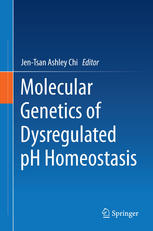Molecular Genetics of Dysregulated pH Homeostasis 2014
دانلود کتاب پزشکی ژنتیک مولکولی تعادل pH نامنظم
| نویسنده |
Jen-Tsan Chi |
|---|
| تعداد صفحهها |
160 |
|---|---|
| نوع فایل |
|
| حجم |
4 Mb |
| سال انتشار |
2014 |
89,000 تومان
بیشتر واکنشها و عملکردهای بیولوژیکی در محدوده pH باریکی رخ میدهند. هر گونه تغییر در pH اثرات قابل توجهی بر عملکرد بیولوژیکی در هر سطح دارد، از جمله تاخوردگی پروتئین، فعالیت های آنزیمی، تکثیر و مرگ سلولی. بنابراین، حفظ تعادل pH در سطح محلی یا سیستمیک یکی از بالاترین اولویت ها برای همه موجودات چند سلولی است. چندین مکانیسم اضافی برای حفظ هموستاز pH وجود دارد، موضوعی که به خوبی در متون علمی و کتاب های درسی پزشکی پوشش داده شده است. با این حال، هنگامی که تعادل pH در سازگاریهای فیزیولوژیکی مختلف و وضعیتهای بیماری مختل میشود، اسیدیته حاصل ممکن است رویدادهای پاتوفیزیولوژیکی مهمی را ایجاد کند و پیامد بیماری را تغییر دهد. بنابراین، درک اینکه چگونه سلولهای مختلف اسیدیته را حس میکنند و با آن تعامل دارند، تأثیر گستردهای در انواع بیماریهای انسانی، از جمله سرطان، سکته، انفارکتوس میوکارد، دیابت، بیماری کلیوی و بیماریهای عفونی دارد. در این کتاب، چندین محقق ژنتیک مولکولی را در مکانیسمهای دقیقی که سلولهای مختلف پستانداران اسیدیته را حس کرده و به آن واکنش نشان میدهند، خلاصه کردند. این فصل ها اسیدیته را با مفاهیم گسترده ای برای درک بیولوژیکی و بیماری های انسانی پوشش می دهد و مکانیسم های حسی مختلف و پاسخ های سلولی به تغییرات pH را در شرایط فیزیولوژیکی (طعم و درد) و پاتولوژیک (ایسکمی و سرطان) بررسی می کند. علاوه بر این، این نویسندگان طیف گسترده ای از رویکردهای تحقیقاتی را برای پاسخ سلولی به اسیدوز در انواع بیماری های انسانی ارائه می دهند.
Most biological reactions and functions occur within a narrow range of pH. Any changes in the pH have great impacts on the biological functional at every level, including protein folding, enzymatic activities and proliferation and cell death. Therefore, maintain the pH homeostasis at the local or systemic level is one of the highest priorities for all multicellular organisms. Many redundant mechanisms are in place to maintain the pH homeostasis, a topic that is well covered in the scientific literature and medical textbooks. However, when the pH homeostasis is disrupted in various physiological adaptations and pathological situations, resulting acidity may trigger significant pathophysiological events and modulate disease outcomes. Therefore, understanding how various cells sense and react to acidity have broad impact in a wide variety of human diseases, including cancer, stroke, myocardial infarction and diabetes, renal and infectious diseases. In this book, many investigators have summarized the molecular genetics on the detailed mechanisms by which different mammalian cells sense and response acidity. These chapters cover the acidity with broad impact in biological understanding and human diseases and review various sensing mechanism and cellular responses to pH alterations in both physiological (taste, pain) and pathological settings (ischemia and cancers). Furthermore, these authors present a broad spectrum of investigative approaches to cellular response to acidosis in a in wide variety of human diseases.




